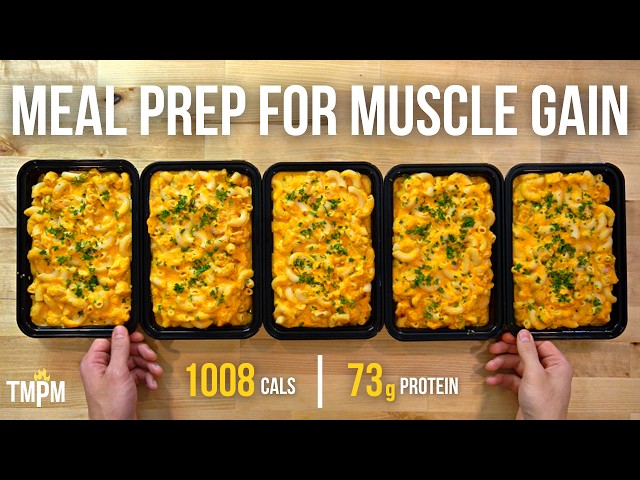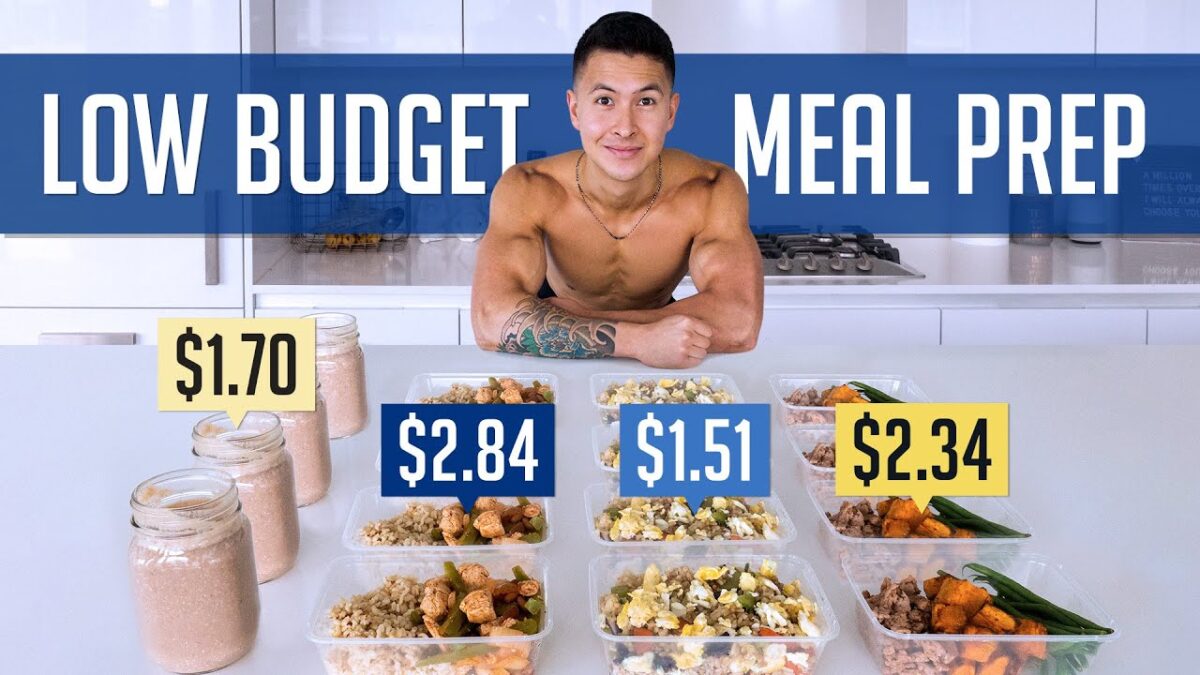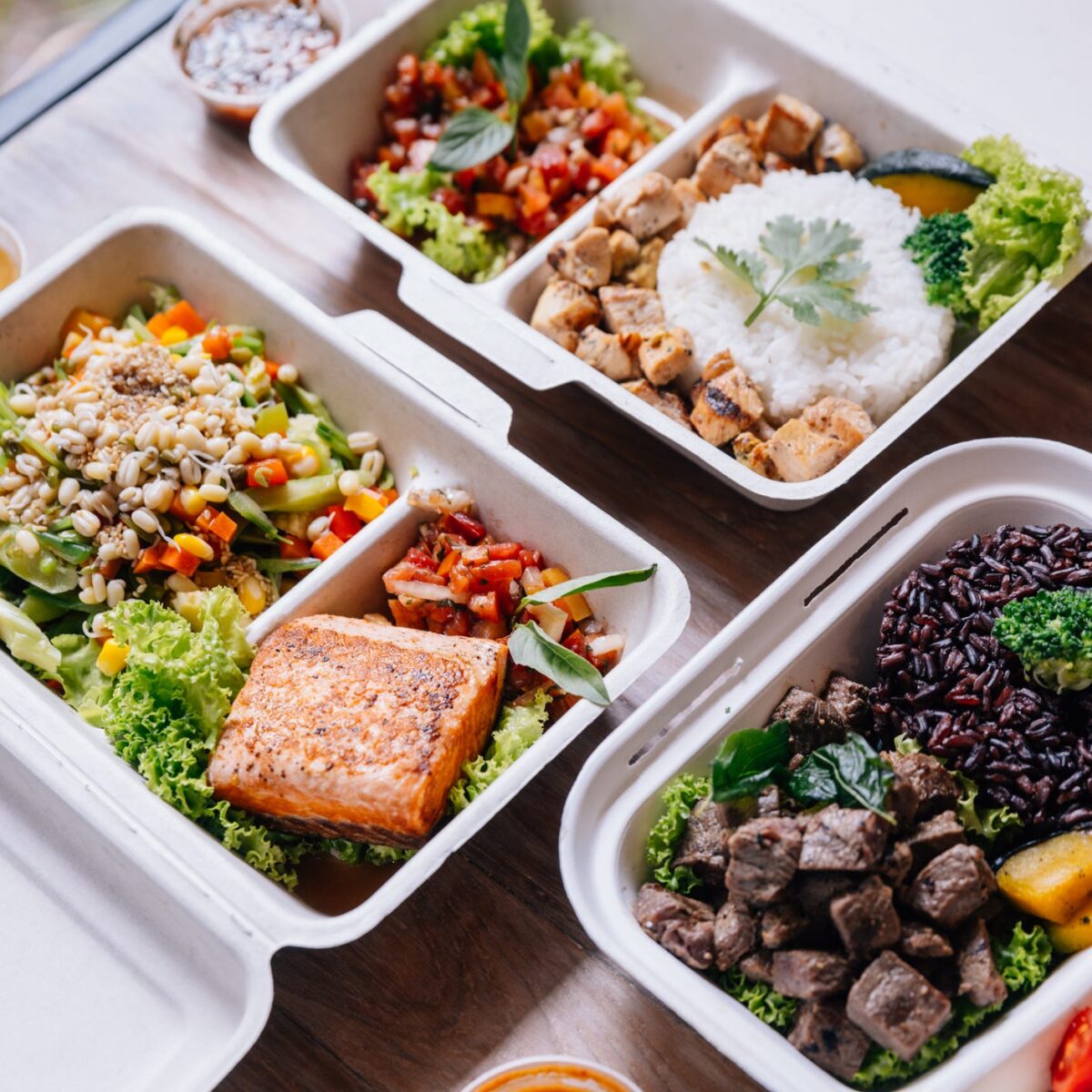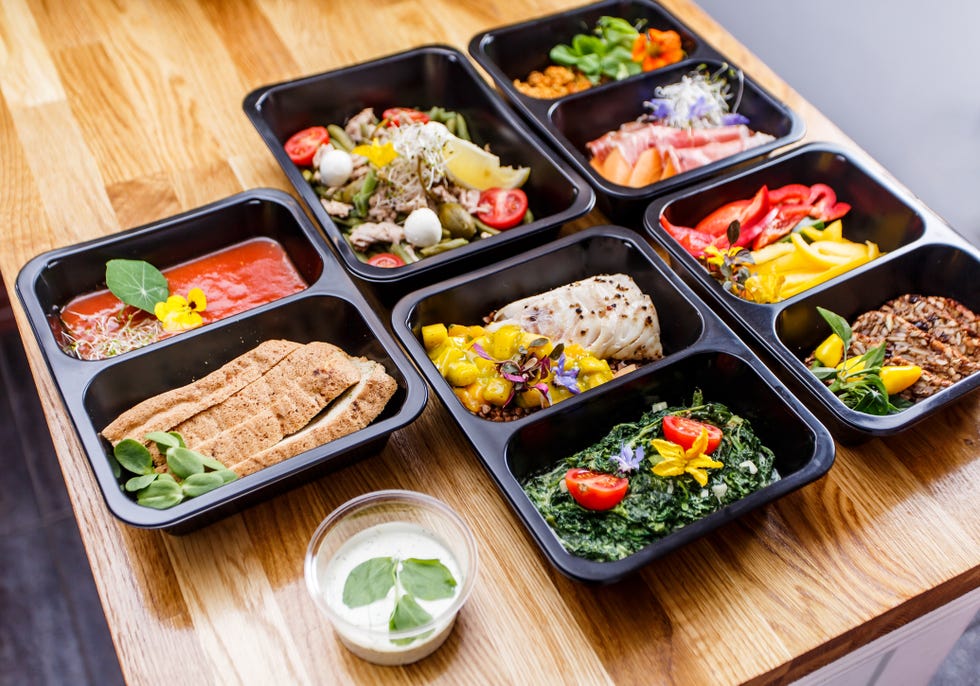Embarking on a journey towards muscle gain requires dedication, and meal prepping can be your secret weapon. By planning and preparing your meals ahead of time, you not only streamline your nutritional intake but also ensure that every bite you take fuels your growth. Imagine the satisfaction of knowing your meals are balanced with essential nutrients, helping you maximize your workouts and boost your progress. With a little organization and creativity, you can transform meal prepping into an enjoyable part of your routine, paving the way for success in your muscle-building endeavors.
Understanding the Importance of Meal Prepping for Muscle Gain
Meal prepping stands as a cornerstone for anyone eager to achieve muscle gain. Adequate nutrition fuels your workouts and facilitates recovery, allowing your muscles to grow and strengthen. Here’s why meal prepping is crucial for your muscle development journey:
- Consistency is Key: Preparing meals in advance ensures that you always have healthy options at hand. This consistency helps maintain your caloric intake, providing the nutrients necessary for muscle gain.
- Time-Efficiency: By dedicating time to prep, you save it during the week. Spend just a couple of hours on the weekend crafting meals, and you will eliminate daily cooking stress, making it easier to stick to your nutritional plan.
- Portion Control: Meal prepping allows you to measure and control your portions, ensuring you consume enough protein, carbohydrates, and healthy fats needed to promote muscle growth.
- Reduce Temptation: With healthy meals readily available, you significantly decrease the likelihood of reaching for unhealthy, convenient options.
By understanding the importance of meal prepping, you set yourself up for success. Embrace this practice as part of your lifestyle, and you will see profound improvements in your ability to achieve your muscle gain goals. With dedication and planning, you’re well on your way to building the body you desire!

Essential Nutrients for Building Muscle
To achieve optimal muscle gain, you must prioritize essential nutrients in your diet. Proper nutrition fuels your body and supports muscle recovery and growth. Here’s a breakdown of the crucial components you need:
1. Protein
- Why it matters: Protein is the backbone of muscle development. It helps repair and build muscle fibers after workouts.
- Sources: Chicken, turkey, fish, eggs, dairy, legumes, and plant-based proteins like tofu and quinoa.
2. Carbohydrates
- Why it matters: Carbs provide the energy needed for intense workouts. They help replenish glycogen stores, which fuel your muscles.
- Sources: Whole grains, oats, rice, fruits, and vegetables.
3. Healthy Fats
- Why it matters: Fats are essential for hormone production, including testosterone, which plays a key role in muscle gain.
- Sources: Nuts, seeds, avocados, olive oil, and fatty fish.
4. Vitamins and Minerals
- Why they matter: These micronutrients support overall body function and recovery.
- Sources: Leafy greens, fruits, and a variety of colorful vegetables ensure that you meet your daily needs.
Incorporate a balance of these nutrients into your meal prep. This approach will not only maximize your muscle gain but will also support your overall health and performance. Remember, variety is key to a sustainable and enjoyable meal plan!
Creating a Balanced Meal Plan for Muscle Growth
A well-structured meal plan is essential for achieving muscle gain and supporting your workouts. By balancing macronutrients—proteins, carbohydrates, and healthy fats—you effectively fuel muscle development and recovery. Here’s how to create an effective meal plan:
Key Components of a Balanced Meal Plan
- Proteins: Aim for high-quality protein sources to aid muscle repair and growth.
- Chicken, turkey, and lean beef
- Fish like salmon and tuna
- Plant-based options such as legumes, lentils, and tofu
- Carbohydrates: Provide the energy needed for intense workouts.
- Whole grains: quinoa, brown rice, oats
- Fruits: bananas, berries, apples
- Vegetables: leafy greens, sweet potatoes, broccoli
- Healthy Fats: Keep your energy levels stable and support overall health.
- Avocado, nuts, and seeds
- Olive oil and fatty fish
Sample Meal Plan for Muscle Gain
| Meal | Ingredients |
|---|---|
| Breakfast | Scrambled eggs, whole-grain toast, and avocado |
| Lunch | Grilled chicken salad with quinoa and mixed veggies |
| Snack | Greek yogurt with berries and a sprinkle of nuts |
| Dinner | Baked salmon, brown rice, and steamed broccoli |
| Post-Workout | Protein shake with a banana |
By adhering to this balanced meal plan, you’ll set a solid foundation for your muscle gain journey. Consistency is key—when you nourish your body effectively, your muscles will respond, grow, and thrive.
You can buy books about Meal Prepping for Muscle Gain from Amazon by clicking here.
Time-Saving Meal Prepping Tips
When it comes to achieving muscle gain, efficient meal prepping can make all the difference. Here are some time-saving strategies to streamline your cooking process while still packing in the nutrients necessary for those gains:
- Choose a Meal Prep Day: Dedicate one day a week to meal prepping. Choose a day that fits best into your schedule, such as Sunday, to prepare for the week ahead.
- Plan Your Meals: Create a simple menu focusing on high-protein recipes. This helps minimize decision fatigue and maximizes your grocery shopping efficiency.
- Batch Cooking: Cook larger quantities of staples like rice, quinoa, and beans. Store them in portioned containers to save time on busy nights.
- Use Versatile Ingredients: Select ingredients that can be used across multiple dishes. For instance, grilled chicken can feature in salads, wraps, or stir-fries, making it easier to prep efficiently.
- Employ One-Pan Recipes: Opt for recipes that utilize a single pan or dish, allowing for easier cleanup and less time spent on cooking.
- Invest in Quality Containers: Use portion-sized containers that make it easy to organize, store, and grab meals on the go, ensuring you stick to your meal prep plan.
By incorporating these time-saving tips into your routine, you’ll find it easier to stay committed to your muscle gain goals while enjoying delicious meals throughout the week.

Incorporating Protein-Rich Foods
To achieve successful muscle gain, incorporating protein-rich foods into your diet is fundamental. Protein not only builds and repairs muscle tissue, but it also supports your metabolism and aids in recovery post-workout. Here are some excellent protein sources to consider:
- Animal Proteins:
- Chicken breast: 31g protein per 100g
- Lean beef: 26g protein per 100g
- Salmon: 25g protein per 100g
- Plant-Based Proteins:
- Lentils: 9g protein per 100g
- Quinoa: 4g protein per 100g
- Chickpeas: 9g protein per 100g
Quick Tips for Incorporation:
- Mix and Match: Combine different protein sources for balanced meals. For instance, pair grilled chicken with quinoa and steamed vegetables.
- Smoothies: Blend protein powder with fruits, Greek yogurt, or nut butter for a quick protein boost.
- Snacks: Opt for protein-rich snacks like cottage cheese, hard-boiled eggs, or protein bars to keep your muscle gain journey on track.
Incorporating these foods consistently into your meal prep will ensure you meet your protein needs. Aim for about 1.6 to 2.2 grams of protein per kilogram of your body weight. By prioritizing protein, you actively support your body’s efforts for optimal muscle gain, making your hard work in the gym even more rewarding.
The Role of Carbohydrates in Muscle Development
When it comes to muscle gain, carbohydrates play a crucial role in your journey to building strength and size. They act as your body’s preferred source of energy, fueling workouts and aiding recovery. Here’s why incorporating the right carbohydrates is vital for muscle development:
- Energy Source: Carbs provide the fuel needed during intense workouts. Eating an adequate amount ensures you can lift heavier and perform better.
- Glycogen Storage: Your muscles store carbohydrates in the form of glycogen, which is essential for sustained exercise performance. More glycogen means more endurance and enhanced muscle recovery.
- Protein Sparing Effect: Consuming sufficient carbohydrates allows your body to prioritize protein for muscle repair and growth instead of using it as an energy source. This is essential for optimizing your muscle gain.
Types of Carbohydrates to Consider
| Type of Carbohydrate | Benefits | Examples |
|---|---|---|
| Complex Carbohydrates | Provide sustained energy, maintain blood sugar | Brown rice, quinoa, oats |
| Simple Carbohydrates | Quick energy boost, beneficial post-workout | Fruits, honey, maple syrup |
By integrating both types into your meal plan, you can optimize your nutrition for muscle gain. Remember to time your carbohydrate intake around workouts, ensuring your body has the energy it needs to thrive. Ultimately, with the right balance of carbohydrates, you can take significant steps toward achieving your muscle development goals.
Healthy Fats: Fueling Your Workouts
When it comes to muscle gain, healthy fats play a vital role in your overall nutrition strategy. While protein often steals the spotlight, incorporating the right fats helps support hormone production, energy levels, and brain function. Embrace healthy fats to fuel your workouts and enhance your muscle-building potential.
Benefits of Healthy Fats for Muscle Gain:
- Energy Source: Healthy fats provide a long-lasting energy source, making them essential for prolonged workouts.
- Hormone Regulation: Diets rich in healthy fats help in the production of hormones like testosterone, which is crucial for muscle growth.
- Nutrient Absorption: Fats aid in the absorption of fat-soluble vitamins (A, D, E, and K), which are important for overall health and muscle recovery.
Top Sources of Healthy Fats:
| Food Item | Monounsaturated Fats | Polyunsaturated Fats (Omega-3 & Omega-6) |
|---|---|---|
| Avocado | 15g (per fruit) | 0g |
| Olive Oil | 10g (per tablespoon) | 1.4g |
| Nuts (Almonds) | 9g (per ounce) | 1g |
| Fatty Fish | 4g (per 3 oz) | 2g (Omega-3) |
| Chia Seeds | 3g (per ounce) | 5g (Omega-3) |
Incorporate these healthy fat sources into your meal prep for balanced nutrition. For instance, a sprinkle of nuts over your morning oatmeal or using olive oil in dressings can elevate your meals while supporting muscle gain. Remember, adding healthy fats isn’t just about calories; it’s about embracing a holistic approach to your strength-building journey!

Batch Cooking: How to Prepare for the Week Ahead
Batch cooking is a game-changer for anyone focused on muscle gain. By preparing meals in advance, you can effortlessly fuel your body with the nutrients it craves, while saving both time and energy during the week. Here’s how to get started:
Steps for Effective Batch Cooking
- Plan Your Meals:
- Choose recipes that are rich in protein, healthy fats, and complex carbohydrates.
- Aim for variety to keep your palate excited—try different sources of protein like chicken, fish, beans, or tofu.
- Grocery Shopping:
- Create a shopping list based on your recipes.
- Stock up on essentials for muscle gain such as quinoa, oats, sweet potatoes, and leafy greens.
- Set Aside a Day:
- Dedicate a few hours on the weekend to cook.
- This will set you up for success during busy weekdays.
- Cooking in Batches:
- Prepare large portions of key meals.
- Consider using the oven, stovetop, and slow cooker simultaneously for efficiency.
- Portion Control:
- Divide meals into single servings using containers.
- This makes it easy to grab a meal on the go, ensuring you maintain your muscle gain goals.
Benefits of Batch Cooking
- Saves time during the week.
- Reduces the temptation to eat unhealthy convenience foods.
- Keeps your muscle gain journey on track by ensuring you have nutrient-dense meals readily available.
By adopting these batch cooking strategies, you’ll find it easier to stay committed to your muscle gain journey, maximizing your efforts both in and out of the gym!
Storing and Reheating Your Meals
Properly storing and reheating your meals is essential for maximizing your muscle gain journey. Not only does it save time, but it also ensures that you maintain the nutritional value and taste of your meal preps. Here are key tips to help you store and reheat your meals effectively:
Storing Your Meals
- Use Airtight Containers: To keep your meals fresh and free from contaminants, invest in high-quality, airtight containers. Glass containers are a great option as they are durable and microwave-safe.
- Label Your Meals: Clearly label each container with the contents and date. This practice helps you track freshness and maintain variety throughout the week.
- Freeze Portions: If you make large batches, consider freezing individual portions. This allows you to enjoy your muscle gain-friendly meals at your convenience without flavor deterioration.
Reheating Your Meals
- Thaw Safely: Always thaw frozen meals in the fridge overnight rather than at room temperature to avoid bacterial growth.
- Even Heating: When reheating, stir meals halfway through the process to ensure even heating. Use a microwave-safe lid or cover to retain moisture.
- Optimal Temperature: Heat your meals to an internal temperature of at least 165°F to ensure food safety and maintain the integrity of nutrients vital for muscle gain.
By applying these storage and reheating practices, you’ll not only streamline your meal prep process but also ensure your body receives the fuel it needs for effective muscle gain!
Monitoring Your Progress and Adjusting Your Meals
When striving for muscle gain, tracking your progress proves essential. By keeping a close eye on your advancements, you can make informed decisions about your nutrition. Here are some effective strategies to guide you along the way:
- Track Your Workouts: Log your exercises to see how strength improves over time. Are you lifting heavier weights? This reflects muscle growth.
- Regularly Measure Your Body Composition: Use a scale, calipers, or body fat measurements to evaluate your muscle mass and fat percentage. Aim for a progressive increase in lean muscle.
- Keep a Food Diary: Document everything you eat. This helps you identify what works for you. Are you hitting your protein and calorie targets?
- Adjust Portion Sizes: If you’re not seeing desired results, consider modifying your portion sizes. Increasing your caloric intake may be necessary for continued muscle gain.
- Incorporate Variety: Change your meal prep strategies. Introduce different protein sources, carbohydrates, and healthy fats to keep your meals exciting and nutritionally complete.
- Set Short-Term Goals: Celebrate small milestones in your journey. By staying focused and motivated, you nurture a positive mindset essential for muscle gain.
Monitoring allows for dynamic adjustments, turning setbacks into opportunities for growth. Remember, each meal prepared with intention brings you one step closer to your muscle gain goal!

Staying Motivated on Your Muscle Gain Journey
Embarking on the muscle gain journey can be both exhilarating and challenging. Motivation acts as the fuel that propels you forward, and it’s essential to sustain it throughout your transformation. Here are some powerful strategies to keep your enthusiasm high:
- Set Clear Goals: Clearly define what you want to achieve. Whether it’s gaining a certain amount of muscle or lifting a specific weight, having tangible goals helps you stay focused and energized.
- Track Your Progress: Regularly documenting your achievements can provide a sense of accomplishment. Keep a journal or use apps to log your workouts, diet, and muscle gain milestones.
- Celebrate Small Victories: Every bit of progress counts! Acknowledge your improvements, whether it’s lifting heavier weights or feeling stronger. Reward yourself for reaching these small milestones.
- Create a Support Network: Surround yourself with like-minded individuals. Join fitness groups or engage in online communities where you can share experiences and gain inspiration.
- Stay Educated: Immerse yourself in knowledge about muscle gain. Read articles, watch videos, or listen to podcasts to keep your motivation sparked by new information and techniques.
- Vary Your Routine: Avoid workout monotony by introducing new exercises or training styles. Adding variety can ignite excitement and keep your muscle gain journey fresh.
Incorporating these strategies can help you maintain motivation and make your muscle gain journey a fulfilling adventure. Remember, consistency and determination are your best allies!
Frequently Asked Questions
What is meal prepping, and how does it aid in muscle gain?
Meal prepping is the process of preparing your meals in advance, which is especially beneficial for those looking to gain muscle mass. By planning and cooking meals ahead of time, you ensure that you have the right balance of proteins, carbohydrates, and fats readily available at your fingertips. This practice not only saves time but also helps you maintain a consistent calorie intake that supports muscle recovery and growth, allowing you to focus on your workouts without worrying about what to eat next.
How do I plan a meal prep schedule for muscle gain?
Planning a meal prep schedule requires considering your weekly goals, workout routine, and time limitations. Start by determining how many meals you need for the week based on your calorie needs. Allocate days for grocery shopping and cooking, preferably on the weekend, when you can dedicate more time. Use a variety of protein sources like chicken, fish, and legumes, and combine them with whole grains and plenty of vegetables. This variety not only keeps your meals exciting but also ensures that you receive essential nutrients needed for optimal muscle growth.
What types of foods should I include in my muscle gain meal prep?
For effective muscle gain, your meal prep should include foods rich in lean proteins such as chicken breast, turkey, fish, eggs, and plant-based proteins like lentils and chickpeas. Complement these with complex carbohydrates like quinoa, brown rice, and whole-grain pasta, which provide sustained energy during workouts. Don’t forget healthy fats from sources such as avocados, nuts, and olive oil, as they are vital for hormone production and cellular health. Including a variety of colorful fruits and vegetables will ensure that you’re also getting the vitamins and minerals necessary for effective recovery.
How can I make my meal prep more convenient and enjoyable?
Making meal prep convenient and enjoyable starts with organization. Invest in quality storage containers to keep your meals fresh and portioned appropriately. You can also enhance the experience by trying new recipes or flavor variations, allowing you to savor each meal. Consider setting aside some time during your prep to listen to music or a podcast to make it a fun activity. Lastly, involve friends or family in the process, as cooking with loved ones can turn meal prepping into a joyful occasion, helping you stay motivated on your fitness journey.
Can meal prepping save me money while trying to gain muscle?
Absolutely! Meal prepping can significantly cut down on your food expenses as it allows you to buy ingredients in bulk, reducing costs per serving. Planning meals ahead of time helps minimize food waste, as you’ll only purchase what you need. Additionally, by avoiding impulsive dining out or fast food, you can keep your budget in check. This financial savings, combined with the ability to control ingredients and portion sizes, gives you the power to optimize not only your muscle gains but also your financial well-being.
